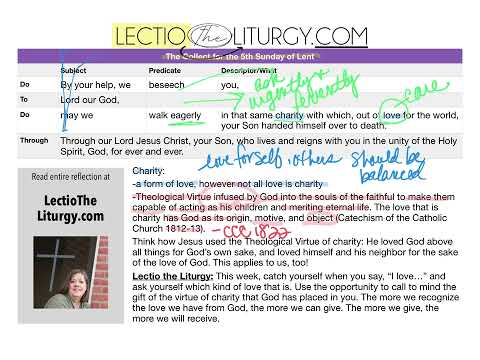Collect 5 Sunday Lent
This week we Lectio the Liturgy with the Collect for the Fifth Sunday in Lent.
By your help, we beseech you, Lord our God, may we walk eagerly in that same charity with which, out of love for the world, your Son handed himself over to death. Through our Lord Jesus Christ, your Son, who lives and reigns with you in the unity of the Holy Spirit, God, for ever and ever.
Our prayer this week has us asking God urgently and fervently (the definition of beseech) that we walk in the same charity that Jesus had when he gave himself to die for us. We even want to walk eagerly in Jesus’ charity. Is Jesus’ charity plain old love?
The prayer tells us that from Jesus’ Charity he had a love for the world. In the Latin translation of the prayer, the word for love is diligens. In addition to love, it also means care, attention, or prize highly.
Charity and love. We see them used often and we see them interchanged often as if they’re the same thing. They are, and they aren’t.
Perhaps you’ve heard that all cantaloupes are muskmelons, and not all muskmelons are cantaloupes. There are other types of melons are in the muskmelon family, honeydew, Persian melon and even a Santa Clause melon. While it may seem a little crazy to compare love with muskmelons - stay with me.
While Charity is a form of love, not all love is Charity. Like muskmelons, love comes in different types.
There is a love that wants good things for one’s self. For example, I love a great salad.
There’s a love that desires good things for others. I love my family and I want only the best things for them.
Both of the types of love mentioned above are good, but should be balanced. Love isn’t all about me, and a love that is all about one’s self will only bring ruin. Yet if I love myself, I want to be the best I can be, I want to be what God intended me to be, and I want that for others, as well.
Charity is one of the three Theological Virtues along with Faith and Hope. A Theological Virtue is infused by God into the souls of the faithful to make them capable of acting as his children and meriting eternal life. (CCC1813) The love that is charity has God as its origin, motive, and object. (Catechism of the Catholic Church 1812).
Being infused by God into our souls, Charity is not a love we manufacture on our own. It is a gift.
With Charity, we are able to love God above all things for his own sake, and we love ourselves and our neighbor for the love of God. (CCC1822) The desire we have to love God and to love his people come from the gift of the virtue of Charity. It’s something like being a fountain. We are the fountain, our arms reaching up and out. God supplies the water. We reach up, giving back to God what he gave us, and we reaching out, giving to others the overflow of love we have received from God.
If we are to walk in Charity like Jesus did, we also need to remember that true charity is selfless and sacrificial and the giving isn’t painful. The more we give, the more God supplies. Our fountain will never run dry.
I found it enlightening to think about Jesus and the love he showed, through the lens of the virtue of Charity. Jesus received the same virtues that we have. He loved, he forgave, he healed, and he even fed people because of his love for God. And while he gave, he received. He never tired, he never wavered, because he loved the Father above all things, and from that love, he loved. What a different place the world would be if more people would love from the love of Charity.
Another thing to note about love is that love is an act of the will, it is not a feeling. The same is true when we act out of Charity, however, because charity is a virtue that is a gift from God, our act of charity is of a supernatural nature, in which we love God for being God and we don’t act hoping for a reward. If that sounds daunting, remember that God has plenty of grace to help us out.
Lectio the Liturgy: This week, catch yourself when you say, “I love…” and ask yourself which kind of love that is. Use the opportunity to call to mind the gift of the virtue of charity that God has placed in you. The more we recognize the love we have from God, the more we can give. The more we give, the more we will receive.
Thanks for praying with me,
Julie
